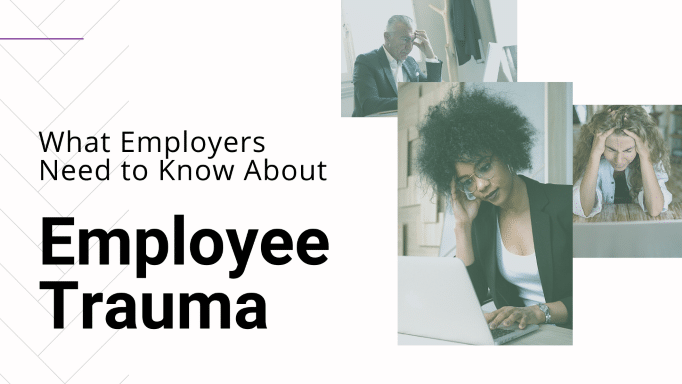
I think it’s fair to say that the vast majority of employers want to create an environment that’s good for their employees. That seems to be easier said than done right now. We’re all living through trauma in one way or another this year. As a mental health speaker, I’ve heard from countless business owners and HR leaders lately who want to do what’s right for their team, but aren’t sure exactly what to do.
2020 has created new challenges that most employers were unprepared to handle. From COVID to racism, employees have experienced trauma at all new levels throughout the year so far. And with everything still up in the air, the mental health challenges are continuing.
As an employer, helping your employees be able to process the trauma, anxiety, stress, and other mental health challenges they’re facing this year is crucial.
Why do employers need to care about employee mental health?
Let me be clear, I don’t believe that someone’s personal life is their employer’s responsibility. We make our own decisions and are ultimately responsible for what we choose to do, not do, and the steps we choose to take to get the help we need.
However, our society loves to use the “leave your problems at the door” mentality when it comes to the workplace.
That’s impossible, and I’m calling BS.
As people, we aren’t able to compartmentalize in this way. We just can’t do it. If you have something going on privately, it’s going to impact you at work. Even if you’re great at slapping on a “happy face” and keeping things under wraps so coworkers don’t notice, it’s still going to affect your job in some way, shape or form.
If you’ve experienced trauma (or are continuing to experience it) you can’t decide to just effectively shut it off for a large part of your day.
Therefore, when it comes to employees who are really struggling through trauma, it’s important that employers care about it because it actually affects the bottom line.
Individuals will be more PRODUCTIVE. Teams will PERFORM better. And the company will be more PROFITABLE.
Mental health impacts the bottom line
It feels a little coldhearted to talk about the financial impact that mental health has in the workplace when you think about the way that depression, anxiety, and trauma impact your employees on a personal level. But if we’re honest, money speaks.
Business leaders have to weigh the impact of circumstances against their bottom line. That’s what helps them stay in business and keep people employed.
A recent World Health Organization (WHO) study found that depression and anxiety disorders “have a significant economic impact; the estimated cost to the global economy is US$ 1 trillion per year in lost productivity.” That’s a big number!
When people experience trauma and struggle to process it or receive help for it, it can lead to anxiety and depression. As I pointed out earlier, it’s impossible for your employees to be in this mental state and still perform at their highest level. But WHO also found that, “Workplaces that promote mental health and support people with mental disorders are more likely to reduce absenteeism, increase productivity and benefit from associated economic gains.”
I believe companies need to stop looking at things like hiring professional mental health speakers, providing paid mental health days, and providing their teams with the resources they need as an expense and instead view them as investments. Investing in the mental health of your employees is an investment in your business.
How do you know if an employee is experiencing trauma?
An advantage that you have as an employer right now is you don’t have to wonder if your employee has been exposed to trauma. While it’s still important for you to understand how to recognize the signs, in 2020, it’s safe to assume that your team has experienced trauma.
First, it’s helpful to understand that there are different types of trauma. It can be caused from one single event—like watching the murder of George Floyd. Or it can be caused from constantly being in a stressful situation—like living through the uncertainty that comes with a worldwide pandemic.
Red flags and warning signs that an employee is struggling with mental health challenges
I’m not a licensed mental health professional. If you want more information, I encourage you to do your research or reach out to a psychologist or other mental health professional who can answer your specific questions.
However, there are some general signs you can watch for that indicate your employee may be struggling. These include things like:
- Change in work habits. This could look like missed deadlines, lack of motivation, difficulty concentrating. It could also include more frequent errors or mistakes in work or receiving complaints from clients.
- Increased absenteeism. This can also include tardiness or more frequent/longer breaks.
- Avoidance of social interaction. This includes things like staying out of the conversation during meetings, not participating in “water cooler” talk, or avoiding eating in common areas with coworkers.
- Change in appearance. This could include breaking company dress code or just subtle differences such as not placing as much emphasis on appearance.
- Change in mood. If you notice an employee is beginning to have outbursts, seems more irritable or less patient, it could be the sign of a mental health challenge.
It’s easy for employers to see the red flags above and jump to thinking it’s a performance issue that needs to be addressed with disciplinary action. When this happens, employees might be written up when what they really need is support.
It’s important, now more than ever, to look at what’s happening and what may be impacting your employees’ work performance.
What resources can employers share?
I don’t believe you need to make the biggest financial investment. Yes, it’s great if you have health insurance plans and employee resources groups and benefit packages around mental health. If you do, keep investing in that. But also take advantage of the free things that you can just put out there.
Here are a few ideas on how you can support mental wellness for your employees and help them through trauma:
Compile a list of resources
Put Google and YouTube to work for you. Start looking for links and videos that you can share with your employees. Create a list of all these resources. Then you can group them into categories such as trauma, anxiety, stress, depression, self-care, and dealing with difficult emotions.
A few nonprofit organizations you can get resources from include:
- National Alliance on Mental Illness
- Mental Health America
- American Psychiatric Association Foundation: Center for Workplace Mental Health
- National Institute of Mental Health
Write a message—or better yet, have the CEO record a message—sharing why the company is providing the list of resources and how the company stands with employees who are struggling with trauma or mental health challenges.
Think about the impact that would have on building trust with employees. It would create more loyalty.
Ask employees what they need
There are some key phrases that I encourage people to use when having conversations around mental health. These include things like, “What do you need from me?” and “Help me understand.” These phrases are effective in the workplace as well.
I think employers should be taking the stance of asking employees what they need. You don’t know the specific struggles that each employee is facing, so it’s difficult to assume you know exactly what they need. So, ask them.
You may have people of color working for you who are experiencing trauma over the racial tension dividing the country right now. You may have employees who are experiencing anxiety triggered from the media headlines of violence and hatred. Or you may have employees working remotely who live alone and feel isolated and depressed.
Employers need to focus on opening the door for real dialogue to happen so they can support employees in the way they need it most.
Make it easy for your employees to take advantage of mental health resources
Remember that there is a stigma that surrounds mental health. This stigma stops people from getting the help they need, even in the midst of the trauma and anxiety that’s happening this year.
The stigma is what causes people to poke fun at these resources when others are around. Many have a fear of admitting they’re struggling because they don’t want to look weak. But you never know who is going to take advantage of them when others aren’t around.
While it’s great to put pamphlets and brochures out in the lunchroom, people might be leery of grabbing one when others are around.
Make sure you provide them access to resources in multiple ways.
- Leave brochures on the table in the break room.
- Send an email with resources that people can take advantage of if they’re interested.
- Create a culture that promotes mental wellness. Incorporate messages around mental health into your team meetings. Instead of starting a meeting with an ice breaker, share a video about trauma or self-care.
- Provide them with access to tools such as a depression self assessment tool
- Make it easy for employees to take a “mental health day”. And instead of questioning them on whether they really need to take the day off, give them the OK and ask them if there is anything you could do to help them.
- Build trust with your employees. This takes time, but it’s effective. Let them know that the managers and leaders within the company care about the people, not just the bottom line.
- The Body Keeps the Score: Brain, Mind, and Body in the Healing of Trauma is a great resource that I always recommend when it comes to trauma. It’s an amazing book and so powerful on how trauma impacts our bodies. Read it yourself and consider providing copies for your employees.
- Recommend an activity like Yin Yoga. Many workplaces already offer some form of yoga, have someone come in to do Yin Yoga for trauma, or invest in the videos.
- Check out the mini-course and guides on self-care located here.
- I wrote a book and workbook called Transforming Stigma: How to Become a Mental Wellness Superhero. It provides actionable tips for those who are struggling or those who want to support others who are.
How the Mike Veny brand is supporting employers
The Mike Veny team is working hard to support employers so they can support their employees with mental wellness. We’re not mental health professionals, just people who care. We’re putting out content that is simple and practical.
Here are some of our latest articles that you may benefit from:
- Tense & Triggered: How to Diffuse Conflict in a Year of Pandemic, Politics, and Protests
- Addressing Workplace Mental Health and Wellness During Reopening: What You Need to Know as an Employer
- How Employers Can Support Employees’ Mental Health During the Pandemic
- The Best Anxiety Resources Online
- What People Need for Better Workplace Mental Health
- Dear Diversity and Inclusion Officer: Stick with it, the Work You’re Doing Matters
- Why Employees Don’t Care About Diversity Training and 6 Tips to Change That
Check out these YouTube videos:
- How the Mike Veny Brand is Committed to You for the Rest of 2020
- How to Address Reopening Anxiety in the Workplace
- Self Care Tips – 3 Simple Questions to Ask Yourself
- Self-Care Tips for Mental Health
Online course: How to Find Peace in Times of Uncertainty
This year I created an online course to help people find peace amidst all that’s happening in the world. You can watch a sample of the course in the video below. You can buy it in bulk for your employees.
Transforming Stigma in the Workplace
I’m also continuing to give presentations on transforming stigma in the workplace virtually. If you’re interested in scheduling a presentation for your staff, reach out to me here.
Make a bold statement to your employees
We’re in a day and age when people are looking to hear where companies stand on challenging issues. Your employees need to know how you’re going to stand by them and support them through the challenges they’re facing this year.
Don’t be afraid to put out a bold message for your team and the world to hear. As long as you follow through, it’s going to make you a good company in the eyes of the world. But even more importantly, you’re going to create a workplace culture where employees can thrive.
And here’s my bold statement to you as an employer: I WILL LISTEN. If you want to reach out to discuss something sensitive or talk about a problem that your organization is facing around these topics, the door is open and I invite you in.



